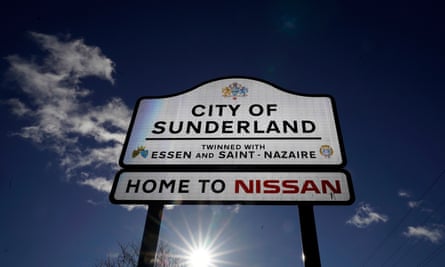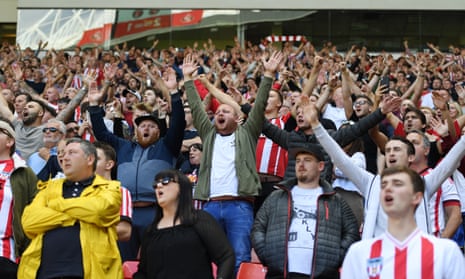Andrew Cammiss got up at four yesterday morning to set off on a 250-mile trip to Oxford for a third division football match. “I took my lad Niall who’s named after my favourite player,” he reveals. Along with other club legends Peter Reid and Kevin Phillips, an image of Niall Quinn is inked on the 39-year-old superfan’s body. “It takes my mind off things. Tattoos show my love for the lads.”
By “things” he means the latest kick in the teeth to his home city. Nissan has scrapped plans to manufacture the X-Trail sport-utility vehicle there. Despite reassurances that the cancellation does not imperil the plant, which employs about 7,000 people, Cammiss fears the worst. “I’ve a cousin and uncle who work there. Everyone knows someone who works there. If Nissan goes we’ll be gutted for a bit, but we’ll get used to it. There’s always the football.”
Such blind faith is not shared by Father Marc Lyden-Smith. Like Cammiss, he was an unlikely star of Netflix’s documentary Sunderland ’Til I Die, a fly-on-the-wall portrait of last season’s descent into oblivion, or League One as it is more commonly known. In the opening episode, the local priest began his sermon with the incantation: “Dear Lord, help Sunderland because the success of our team leads to the success and prosperity of our city.”
This season there has been a mini-revival, with new owners – rather than divine intervention – inspiring a push for promotion. But the dysfunctionality exposed in the documentary continues to blight a city scarred by both sporting and economic austerity. Thatcherism oversaw the destruction of the mines and shipyards in the 1980s. According to a government report, a hard Brexit would lead to a 16% economic decline in the region. The fallout from the Nissan cancellation might prove to be the final nail in the coffin.
“The very culture of this city is we make things – that’s why we’re Mackems,” Lyden-Smith tells me in a cafe near the metro railway station. “This is the city’s identity. It was eroded with the closure of the shipyards and pits. There is a tangible sense of anxiety and worry about what’s happening with Nissan. If that goes, what else do we make? There are some business leaders looking at new development, but who’s the major employer of the last 10 years? It’s the football club, which has had back-to-back relegation and redundancies.”
It was the intense connection between city and club which inspired Fulwell 73 producer Leo Pearlman and two other Sunderland fans to make the Netflix series. It is a love letter to a city on its knees, a searing, riches-to-rags account of the central role the people’s game still plays in a left-behind, deindustrialised area. “It’s the last thing we have,” says Pearlman. “The Nissan thing feels like another blow to the city. It’s terrible news.”

If there is hope, it lies in the fans. Despite the club’s rapid freefall, the crippling debt and bad investments, the rise in child poverty and decline in public services, attendances at the Stadium of Light have averaged more than 30,000. On Boxing Day, a new League One record was set when about 46,000 turned out to watch the team beat Bradford City; only Manchester United and Liverpool attracted more supporters.
Taxi driver Peter Farrer says the football has always been an escape from economic woes. As he drives past the ground’s Davy Lamp monument, a tribute to the colliery it has replaced, he argues that the sport has been “taken game away from the working man”. But Sunderland is the exception. There would be no club without the supporters; there would be no point to it.
Farrer has become a local hero since appearing in the documentary, but “I’m not big-headed or up me own arse. People do recognise us in the street. I’ve had nobody slag us. Just support. We’re all fanatics like. We cannot help ourselves. We never lost the hard core supporters. You just cannae give up. If Hitler invaded Poland on Tuesday I’d still be at the Blackpool match.”
As we pass the world-famous carmaker, housed in a giant factory complex just off the A19, he suddenly confesses to being a Remainer. Sunderland is known as Brexit City, with 61% voting to Leave. “I’ve had a bellyful of Brexit but I do know the local economy is dependent on Nissan.” He points out the sprawling fields. “These were football pitches but hopefully will now be used to bring the supply chain nearer. That’s if Nissan doesn’t go. Nobody knows for sure.”
Half a mile away, in a village pub, a former Nissan employee – Steven France – is waiting for me. He’s also a former footballer. After starring for a Sunday League team, he played for Barbados against Cuba in the 2002 World Cup qualifiers. Today he’s a community leader.
“Nissan won’t necessarily close tomorrow,” says France, “but it will in 10 or 15 years time. Jacob Rees Mogg’s favourite economist, Patrick Minford, said the car industry will have to be wound down if Britain left the EU. I’ve got to explain this to my community. People work blood, sweat and tears in that factory.
“Sure, the club brings people together. It is the last big community. But how will that feed people? How is the club going to take the 16% GDP hit in the city?”
Anthony Clavane is a sports writer and the author of Promised Land and Moving the Goalposts
